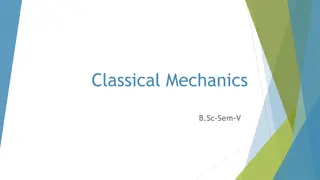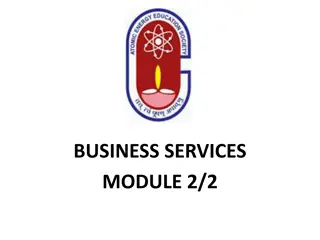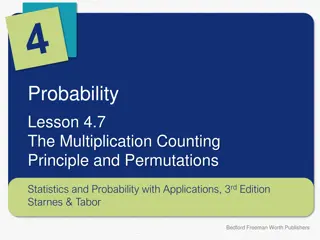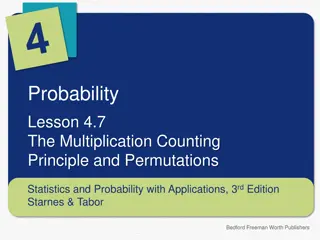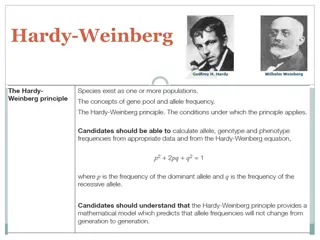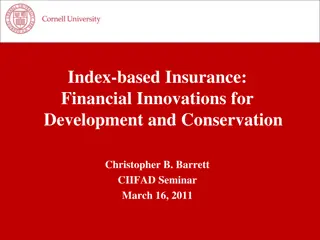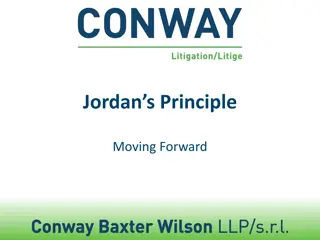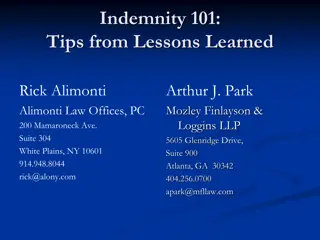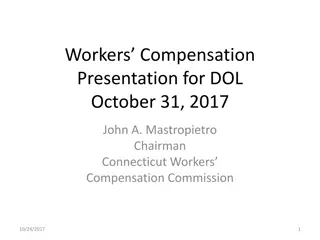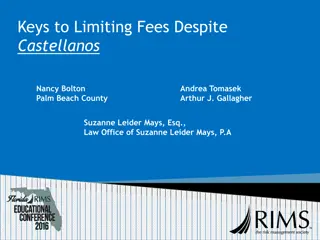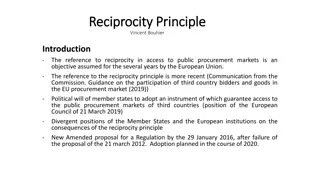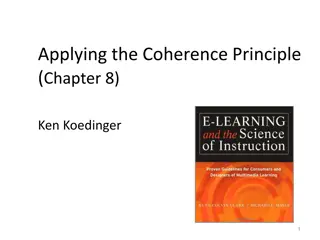Risk of E&O Claims on Brokers: Premiums Soaring
Join Alan Chandler to explore the rise of Errors & Omissions claims against brokers and reasons behind soaring broker Professional Indemnity premiums. Learn to mitigate risks and navigate recent statutes affecting E&O.
0 views • 19 slides
Understanding GSC Employment Loss Insurance for Entrepreneurs
Explore the importance of employment loss insurance for entrepreneurs, the limited coverage provided by existing systems, and the benefits of GSC's specialized protection for business leaders facing involuntary job loss. Discover key insights from the Employment Observatory for Entrepreneurs and det
2 views • 14 slides
Heisenberg's Uncertainty Principle in Elementary Quantum Mechanics
Heisenberg's Uncertainty Principle, proposed by German scientist Werner Heisenberg in 1927, states the impossibility of simultaneously and accurately determining the position and momentum of microscopic particles like electrons. This principle challenges classical concepts of definite position and m
0 views • 49 slides
Counting Principles and Pigeonhole Principle Explained
Explore the concepts of counting principles and the pigeonhole principle through practical examples and tips. Learn how to apply these principles to solve problems effectively. From understanding basic counting rules to the advanced pigeonhole principle, this content provides insights and guidance o
2 views • 35 slides
Understanding Marine Hull Insurance for Vessels
Marine Hull Insurance encompasses the protection of various vessels, such as ocean-going ships, fishing vessels, and more, covering damages, liabilities, and construction risks. The policy, issued for 12 months, includes Charterers Liability, Ship Repairers Liability, and indemnity for vessels under
0 views • 15 slides
Minimizing Risk Exposure in Contracts
This presentation led by Sidney W. Degan, III, focuses on reducing risk exposure through contract provisions such as indemnity and additional insured clauses. It emphasizes the importance of considering anti-indemnity statutes, the role of certificates of insurance, and the implications of dealing w
0 views • 22 slides
Understanding Classical Mechanics: Variational Principle and Applications
Classical Mechanics explores the Variational Principle in the calculus of variations, offering a method to determine maximum values of quantities dependent on functions. This principle, rooted in the wave function, aids in finding parameter values such as expectation values independently of the coor
0 views • 16 slides
Understanding the Meaning and Principles of Insurance
Insurance is a contractual agreement where the insurer agrees to compensate the insured for losses. Key principles include utmost good faith, insurable interest, indemnity, proximate cause, subrogation, contribution, and mitigation. Life insurance provides financial security to beneficiaries in case
0 views • 9 slides
Understanding Rights and Duties of Indemnifier
Learn about the roles of indemnifier and indemnity holder in contracts, including their rights and duties. Explore examples and case laws to understand indemnity better, covering the concept of indemnification in various scenarios.
0 views • 18 slides
Understanding Le Chatelier's Principle in Chemical Equilibrium
Le Chatelier's Principle states that when a system at equilibrium is disturbed by changes in concentration, temperature, or pressure, the equilibrium shifts to counteract the change. This principle can be applied to predict the direction of equilibrium when changes occur. Changes in concentration, p
0 views • 10 slides
Understanding Business Interruption Insurance Policies
Business Interruption (BI) insurance covers loss of gross profit due to reduction in turnover or increase in cost of working expenditure. The policy operates on the principle of indemnity, aiming to restore the client financially to a pre-loss position. Different variants exist for sum insured and b
0 views • 24 slides
Understanding the Multiplication Counting Principle in Probability
The Multiplication Counting Principle and Permutations play a crucial role in determining the number of possible outcomes in various processes. This lesson covers how to use factorials to count permutations, compute arrangements of individuals, and apply the multiplication counting principle to dete
0 views • 14 slides
Understanding Jordan's Principle and Its Impact on First Nations and Inuit Children in Canada
Jordan's Principle was named in memory of Jordan River Anderson, a young boy whose tragic story led to the establishment of a legal requirement ensuring access to services for First Nations and Inuit children in Canada without delays or disruptions. This principle aims to prevent situations where ch
0 views • 9 slides
Key Principles of Insurance Explained with Visuals
Understanding the principles of insurance is crucial for both insurance seekers and companies. The principles include Utmost Good Faith, Insurable Interest, Indemnity, Contribution, and Subrogation. These principles ensure transparency, fairness, and protection for policyholders. Visual representati
0 views • 6 slides
Arch/PUA Design Professional Litigation Review Presentation
The presentation discusses indemnification for 3rd party claims in construction contracts, highlighting a court case where the indemnity clause could not be used for 1st party claims. It emphasizes the importance of clarity in indemnification clauses to differentiate between liabilities faced from t
0 views • 37 slides
Understanding Fluids, States of Matter, and Phase Changes
Exploring key concepts in physics including Bernoulli's Principle, viscosity, cohesion, states of matter (solid, liquid, gas, plasma), phase changes (evaporation, condensation, etc.), density, pressure, and more. Discover the properties and behaviors of fluids in relation to gases and liquids, along
1 views • 54 slides
Understanding the Acceleration of the Universe and the Equivalence Principle Violation in the Horndeski Vector-Tensor Theory
Exploring the implications of the Equivalence Principle Violation after reheating in the context of the accelerated expansion of the universe. The study delves into the Horndeski vector-tensor theory, gravitational waves, and the impact of modified gravity and dark energy. Insights are provided on t
2 views • 20 slides
The Multiplication Counting Principle in Probability: Exploring Permutations
Exploring the multiplication counting principle in probability, this lesson delves into determining the number of ways to complete a process involving multiple steps. Using factorials for permutations, the content showcases how to compute permutations of individuals taken at a time. Through examples
0 views • 20 slides
Understanding Hardy-Weinberg Principle and Genetic Frequencies
Gene pool and allele frequencies play a crucial role in the Hardy-Weinberg Principle, a mathematical model predicting allele frequencies over generations. The principle outlines conditions like a large population, absence of mutations, random mating, and more. Equations such as p² + 2pq + q² = 1 h
0 views • 44 slides
Understanding Insurance Terms: Business Bingo and Definitions
Dive into the world of insurance with a fun Business Bingo game featuring key terms like Policy, Insurer, Premium, and more. Explore definitions such as insurable interest, indemnity, and the role of an actuary in calculating premiums. Learn about different aspects of insurance contracts and the imp
0 views • 7 slides
Addressing Cyber Risks in Professional Indemnity Insurance for Law Firms
Professional Indemnity Insurance with Cyber Cover for law firms is crucial due to the increasing risks of cyber-attacks. Regulatory intervention requires clarity on cyber insurance coverage. Our proposals aim to maintain consumer protection, provide insurers with clear guidelines, and offer clarity
0 views • 9 slides
Principle of Majority Rule in Company Law
The principle of majority rule is a fundamental aspect of company law, where the powers of control over a company rest with the general meeting representing the majority shareholders. This principle emphasizes that decisions are made by a simple or special majority vote, except for powers vested in
0 views • 9 slides
Innovations in Index-Based Insurance for Development and Conservation
Explore the potential of index-based insurance as a financial innovation for development and conservation. This type of insurance protects rural livelihoods, prevents poverty, and encourages investment and asset accumulation among the underprivileged. By leveraging objective indices for indemnity pa
0 views • 18 slides
Overview of Subrogation in Marine Insurance and Principles of Indemnity
Subrogation in marine insurance involves the substitution of one person for another in terms of rights and duties. This process is crucial in ensuring indemnity principles are upheld. The doctrine of subrogation plays a significant role in various insurance contracts, excluding those related to life
0 views • 19 slides
Proportionality as Core Principle in Supervising Heterogeneous Banking Sectors: Lessons from Germany
The supervision of a diverse banking sector, such as Germany's with roughly 2,000 banks, is based on the core principle of proportionality. This approach involves tailoring regulations and oversight to fit the individual characteristics of each institution, focusing on qualitative aspects, organizat
0 views • 8 slides
Jordan's Principle: Advocating for First Nations Children's Rights
Jordan's Principle is a vital advocacy tool aimed at ensuring equitable access to necessary services for First Nations children, emphasizing prompt resolution of jurisdictional disputes. Originating from the story of Jordan River Anderson, its implementation has faced challenges and legal battles. C
0 views • 21 slides
Understanding Indemnity: Tips and Lessons Learned
Indemnity is a risk management tool where one party agrees to be responsible for the damages of another party. It is not a liability-shifting mechanism or insurance. Contractual indemnity provisions insulate parties from damages arising from contractual relationships. Different types of indemnity ag
0 views • 48 slides
Comparative Study of Noir Elements in Blade Runner and Classic Films
Explore the neo-noir style in Blade Runner compared to classic film noirs of the 1940s and 1950s. Understand the dark, bleak, and shadowy set designs, psychological explorations, and societal themes that characterize these films. Compare Blade Runner with iconic films like Double Indemnity and Sin C
0 views • 22 slides
Understanding Business Interruption Insurance and Extensions
Alan Chandler, a Chartered Insurer with extensive training experience, shares valuable insights on Business Interruption Insurance (BI). Learn about gross profit vs. insured profit, indemnity periods, sum insured projections, and BI cover for service firms. Explore various BI extensions, such as cus
0 views • 42 slides
Understanding the Pigeonhole Principle in Mathematics
The Pigeonhole Principle, demonstrated through examples and explanations by Dr. J. Frost, illustrates the concept that if you have more "pigeons" than "holes," then at least one "hole" must contain multiple "pigeons." This fundamental principle is essential in solving various mathematical problems i
0 views • 27 slides
Impact of Impact Funding on Insurance Contracts Construction
Exploring the impact of impact funding versus AIG on the construction of insurance contracts, specifically focusing on the insuring clause, exclusion clauses, and the Court of Appeal decision regarding solicitors' professional indemnity insurance. The exclusion clause aims to distinguish personal ob
0 views • 24 slides
Understanding Connecticut Workers' Compensation Act
This presentation provides an overview of the Connecticut Workers' Compensation Act, explaining who is entitled to benefits and the types of benefits available. It delves into the history of workers' compensation laws in Connecticut, highlighting the Triangle Shirtwaist Fire as a turning point in th
0 views • 61 slides
Strategies to Limit Fees Despite Legal Challenges
This informative content discusses challenges related to attorney fees in the context of the Workers' Compensation Act, including constitutional challenges and changes in indemnity benefits duration. Strategies to navigate these challenges and defend against fee schedule deviations are outlined, alo
0 views • 24 slides
Understanding the Reciprocity Principle in Public Procurement Markets
The concept of reciprocity in access to public procurement markets, particularly in the European Union, has gained prominence in recent years. This principle involves mutual opening obligations for public procurement markets while considering concessions and exceptions, such as excluding defense and
0 views • 4 slides
Writing Lab: Principal vs. Principle
Learn the differences between "principal" and "principle" with this informative Writing Lab mini-lesson. Understand their varied meanings as nouns and adjectives, and how they are used in different contexts. Enhance your diction skills and avoid common usage errors. Enjoy learning about the principa
0 views • 4 slides
Legal Principles of Insurance
The legal principles of insurance include indemnity, insurable interest, subrogation, and utmost good faith. These principles ensure fair compensation, financial risk protection, and honesty in insurance contracts. Understanding these principles is crucial for both insurers and policyholders to navi
0 views • 18 slides
Enhancing Student Learning Through Coherence Principle
The Coherence Principle emphasizes the importance of excluding extraneous, entertaining materials to improve student learning. Including such materials can compete for cognitive resources and divert attention from essential information. Utilizing simpler visuals and avoiding websites that violate th
0 views • 7 slides
Understanding Contract of Indemnity and Guarantee
A contract of indemnity involves a direct promise to save one party from harm caused by another, focusing on losses specifically attributable to the promisor or another person. Meanwhile, a contract of guarantee entails a promise to fulfill the obligations of a third party in case of default. Essent
0 views • 23 slides
Overview of Special Contracts in Indian Contract Act
The Indian Contract Act contains special contracts including Contract of Indemnity, Guarantee, Bailment, Pledge, and Agency. This overview covers the definitions, parties involved, and rights of the parties in Contract of Indemnity and Guarantee.
0 views • 26 slides
Understanding the Generalized Pigeonhole Principle in Discrete Math
The Generalized Pigeonhole Principle is illustrated through an example involving selecting cards from a deck. By strategically grouping the cards, we determine the minimum number needed to guarantee at least three cards of the same suit are chosen. Additionally, the process is applied to finding the
1 views • 5 slides






